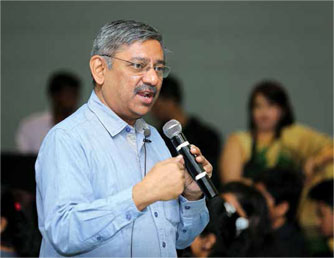The Government of India has unveiled several initiatives aimed at generating employment and employability through programmes such as Make in India, Startup India, and Skill India. The aim is to transform opportunities for India’s youth to move up the value chain of employment and make our demographic dividend a blessing. In this context, the National HRD Network (NHRDN) Mumbai Chapter, recently organised a Career Fest at Nehru Centre in Mumbai, wherein professionals with multifaceted expertise talked on prevailing career trends and also about diverse sectors which are there. Muralidharan Thyagarajan is the Chairman and one of the founding members of Talent Management Inputs and Services (TMI). In this edition, Corporate Citizen brings you his talk on how to pick your first right job, how your personality plays a crucial role while choosing the right role and what is current job scenario in the country.
TMI Group has assisted over 400 corporates; TMI Group has been involved in hiring over 10,000 professionals. Muralidharan has been elected as a member of Micro, Small and Medium Enterprises (MSME), apart from Government of India which formulises and regulates the rules and regulations and laws related to the MSME. He is author of two books called ‘An Expert’s Guide to the Right First Job’ and ‘An Expert's Guide to 101 Jobs for Graduates and MBAs’

Can you imagine an employee doing the same job for 35 years in life? Every day doing the same thing repeatedly. You might be promoted but you will be stuck with the same job, even though you might be transferred from one department to another. This is the condition in the market nowadays. There is a lot of repetition. Ninety per cent of employees in the corporate, when they get up in the morning they think of applying for a leave. The reason is they don’t like their job. Many employees, what they do is, they keep hopping from jobs to jobs; if they don’t like their job, they will keep hopping from one job to another. What will happen? Different boss, different job but you will eventually face the same problem of not liking your job. So first thing you should ask yourself is how to find the right job, which you will enjoy for the next 35 years.
A large number of engineers are not working in engineering domain. More than 70-80% of engineers are working in IT, investment banking, FMCG but very few work in core engineering. Be open to select what is proper for you. What is the ideal time to spend for first job? This is the most important question. We study resumes of about 10,000 CEOs and CXOs. The resumes of CEOs and CXOs tell us a lot, about how he/ she started his or her career, how long he/she stayed and so on. The most interesting fact, a successful CEO or a CXO in the first or second job found the right job and after finding the right job stayed there for 6-8 years. The average time spent is about seven years.
Nowadays, after the campus hiring, employees change their job after six-nine months, because they are unhappy. The reason for this is they are not driven by their passion, they don’t think before applying, they are driven by peer pressure. Employees apply job based on salaries, they don’t think that if a certain company is paying me higher than some other company, there will be a good reason for paying higher salary. The employees who stay for six-seven years, they learn many things from their job, and that’s how they become successful. It is possible that your first job might not be the right one for you, the second should be the right job, the third one must be the right job; if not, then your career takes a beating
Which is the best city to start your non-IT career? Mumbai-there is a research, which shows that those who start their career in Mumbai have a better chance of making to the top. It is a non-IT sector. As I told you earlier, 77% of jobs are only in three industries, BFSI (Banking Financial Services and Insurance) IT/ITeS and Pharma. All the other industries contribute very small. Another interesting fact, IT engineers opt for big names and two-three years later, they apply for an MBA programme.
What is happening nowadays is that you get a job-lot of companies come in the campus, you give a very good interview, because your job is to win that contest. For many people, interview is a contest, so they do their homework and win that contest. But they don’t realise that after winning the contest, you will be the one who is suffering because, you will be doing the job which you don’t like. Seventy per cent of MBAs are graduates and are looking for jobs every three months. ‘What should I do?’ ‘What is my right job?’ —not easy questions to answer. I found out one thing, any graduate could do many jobs. Engineers are coming into many domains. Roles with B Com are much narrower because of accounting.
a Large number of engineers are not working in engineering domain. More than 70-80% of engineers are working in IT, investment banking, FMCG but very few work in core engineering. Be open to select what is proper for you. What is the ideal time to spend for first job? This is the most important question
Most common mistake students make during the campus recruitments is to assume that the responsibility of approaching companies for campus recruitment is upon the placement officer. Students will bombard with questions, which company is coming, which company is not coming, etc. Job search is student’s responsibility. You have to learn the techniques of job searching. College will help you because they will get better quality of students next time. They can say that 95% of students are placed for this year. They are not bothered what quality of job you get, how long you stay in the job, are you happy with your job and it is your luck, whether you will get the right job or not through the campus recruitment process.
Q: I like to go for challenges, I like to do challenging things, and I would love to enter in investment banking. The most challenging part of investment banking is whether you make profit or loss will depend upon me. I would like to do investment banking for more than 60 years.
A: Average life of an investment banker is maximum ten years. What does an investment banker do? Investment banker’s primary job is to make individual or corporation look for money to raise equity. Mostly equity, sometimes debt. Investment banker advices you to invest. They help you. He makes a document saying what he does. The document explains what is called information memorandum; it explains why someone should invest in his company. Their job is to present investment opportunities and convince them to invest. If the investment banker cracks a deal with me for example, then only their company makes money, otherwise they will not earn money. Their job is very stressful. Investment banking is very glamorous, protecting your job is a challenge, and your bonuses may not come.
Q: I have a dream of working in a finance field because it is such a vast field, and there is always new to learn in every field. I haven’t narrowed down to what exactly I want to do in finance but further studies will help me to identify my real passion.
A: When people talk about finance, there are two sides of finance. You work inside a company in a finance department. Finance department’s primary job is to fund operations. In a company, there are customers, there are suppliers, money has to be paid to suppliers, money has to be collected from customers, etc; their job is to ensure money is provided to the business so that it doesn’t stop. Finance sector can be qualified into two types.

Find the job role that suits your personality. The biggest mistake people do is they pick the job, which their friend has opted for. One should know one's core personality, which job role will make one stay for 35 years.
Which is the industry you want to select? In the right company, in the right city, in the right level. Today if I have to find a job, I will look for a company in management sector because management trainee is the best way to start a career. Unfortunately, many companies have stopped the management trainee programme. Entry-level jobs have become more of a transaction role. Broadly speaking, there are four types of personalities, in which you can classify job roles.
Interview is about presenting yourself; it is not about winning the game. Many a time, whenever an interviewer asks a question, there are times when they want to ask something else and if you figure out what they really want to ask, and if you answer that, then it’s a win for you. It is okay to lose in an interview as long as you know what you are looking for-this is what I can do very well or this is what I want to do.
Your first job teaches you everything. You need to have patience and humility to say that I want to learn, I am not here to make money.
Interviewer judges candidates on communication skills. Keep the following points in your mind when you are giving an interview.
By Vineet K